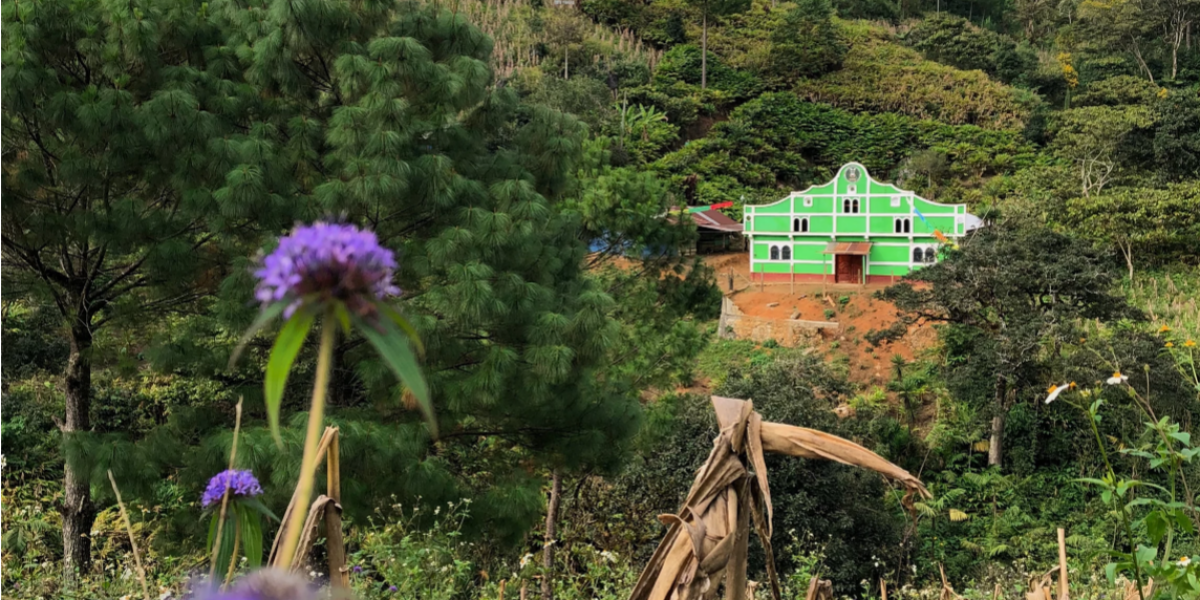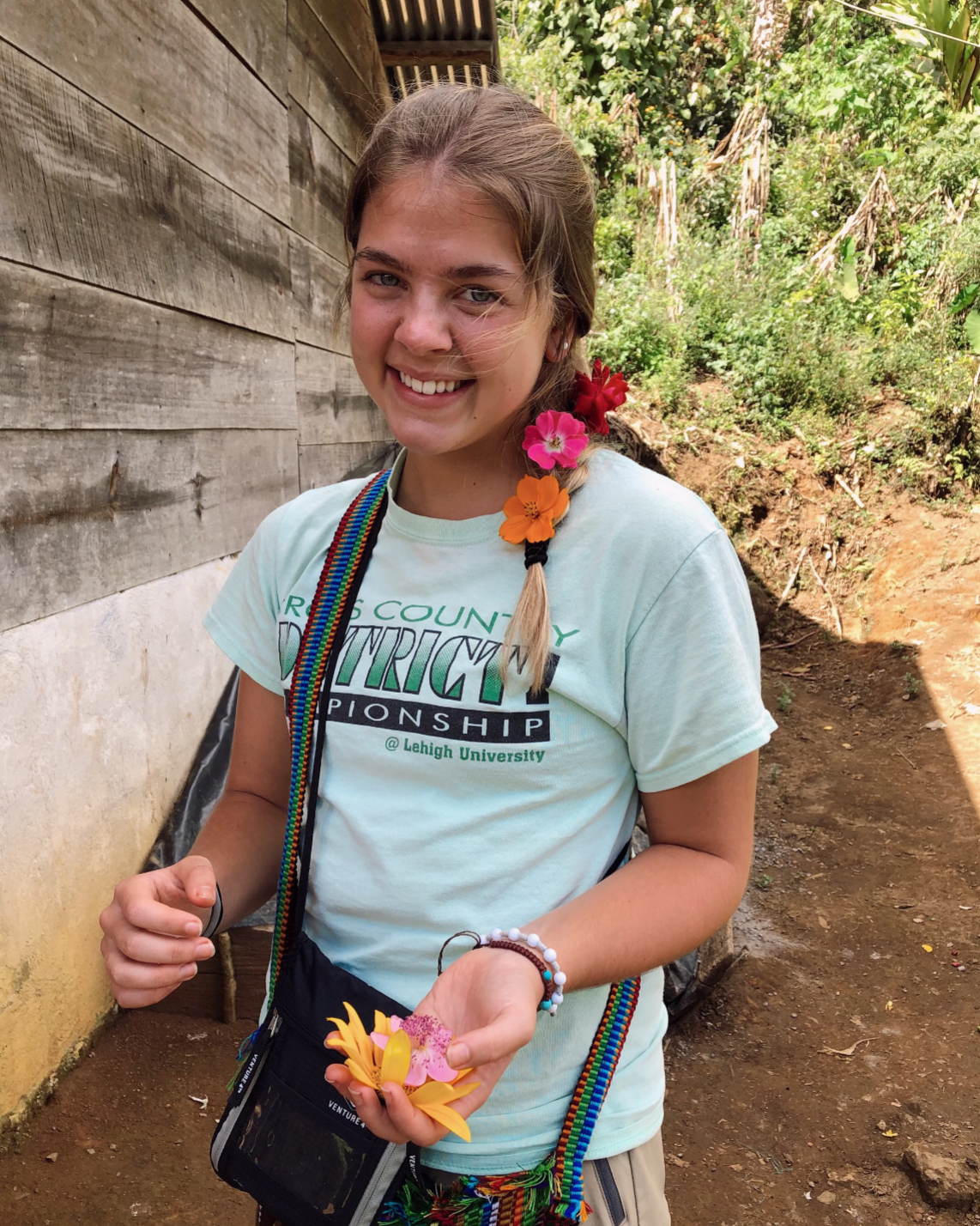Sara Kennel served in Guatemala, through an internship with CASAS (Central American Study And Service). CASAS is a program of SEMILLA (Seminario Anabautista Latinoamericano), which provides biblical and theological education for 13 Anabaptist/Mennonite conferences in Central America and Mexico. SEMILLA is a partner organization of Mennonite Mission Network. To read more from Sara’s gap year blog, click here.
The moments that fill your heart and simultaneously break it, so that you know you’re exactly where you need to be — these are times when it feels like you have the heart of God, if only for a moment.
The Q’eqchi people, an Indigenous group in the mountainous region of Alta Verapaz, Guatemala, welcomed me into one of their communities in San Pedro Carchá. I lived with a friend in the home of a woman named Eva; her daughter, Iris; and her grandson, Isaac, whom we usually called Chaco. Our work with ODIGUA, an organization that works with families to develop cultivation practices in harmony with creation care and community needs, was centered around agroecology and women’s empowerment within the communities.
For the first two weeks, we quite literally hiked all over creation to the houses of different families —working alongside them to plant their crops in small plots of land on the mountainsides and accepting hospitable meals of frijoles (beans), tortillas, caldo (soup) and coffee from each family; This became a consistent trend for our month of work. Hospitality is very important to the people of Guatemala.
During our time planting with the farmers, I became amazed by their ability to farm on a slick, muddy mountainside in the pouring rain. At first, I thought it was the rubber boots they wore that allowed them to achieve this great feat, but when I started wearing rubber boots and continued to slip, I decided it was probably a ‘me’ problem. Even the women who wore tiny sandals to work and walked everywhere did it with ease.
As much as I loved the planting and the time it provided to coexist with nature, I loved equally the connections I formed with children. Chaco, who lived in the house where we stayed, was a frequent playmate and had the most contagious laugh. He was a five-year-old endless ball of energy who either made fun of me or called me, "mi corazón" ("my heart"), and I miss him dearly for it.
Bea was my 9-year-old neighbor, who took my hand from the moment we met and made it her mission to show me around the town. She lit up any room with her bright spirit.
During our time there, we weren’t able to learn much of the Q’eqchi language. This, coupled with our foreign status, at times ostracized us within the communities but not when it came to the children. They loved to play with anything and everything, so there was never much need for communication. Two girls found out about my collection of flowers and proceeded to take me around their property to collect every blossom we could find — even putting some in my hair for me. In the moments when I was especially tired, they were pint-sized reminders of God’s grace, little whispers that there was no expectation of me.
In my final week of work, as we had meetings with the communities to reflect on the work ODIGUA was doing in the community, a woman stood up and recounted her gratitude for the difference it made in maintaining her own crop. Being able to provide for her family in this way had impacted her confidence and way of life. In some ways, I learned more from these times, when the women would share, than I did from the planting. Many of these women — who were never given the opportunity to have an education, to read or to write, or to be leaders in any capacity — stood in front of everyone to introduce their thoughts and ideas. More of these women are becoming facilitators within their communities, as part of ODIGUA’s work.
It took time for me to recognize the prominence of how women’s empowerment is becoming a catalyst in each of these communities. It took time for me to understand that the mindset we had in service was never about "fixing" the people we worked alongside. Instead, it was always about respecting their identities, while bringing positive development to their quality of life. A huge part of this is credited to them being an integral part of the work.
I was taught about a different structure of civilization through the style of life and situations I experienced, but I was taught even more by the stories of unforgettable people.
Gratitude: A word that does not get the credit it deserves for how it changes your mindset. I could paint this experience as picture-perfect moments, if I wanted to, but the reality was that it was hard. It was hard to wake up in the morning and immediately speak in a secondary language. It was hard to get stared at every time I walked outside. It was hard to try to find a way to stay warm on the cold and rainy nights. But it was beautiful to be immersed in another culture. It was beautiful to spend each day hiking in vibrant green rolling mountains. It was beautiful to watch the tired lines in faces transform into broad smiles. It was beautiful to have conversations that transformed my ignorance. It was not always a conscious recognition of giving thanks to God, but God gave me all the strength I needed to find a joy that consistently outweighed the exhaustion. And it was rooted in gratitude.
To the Q’eqchi con Cariño.
Sara








